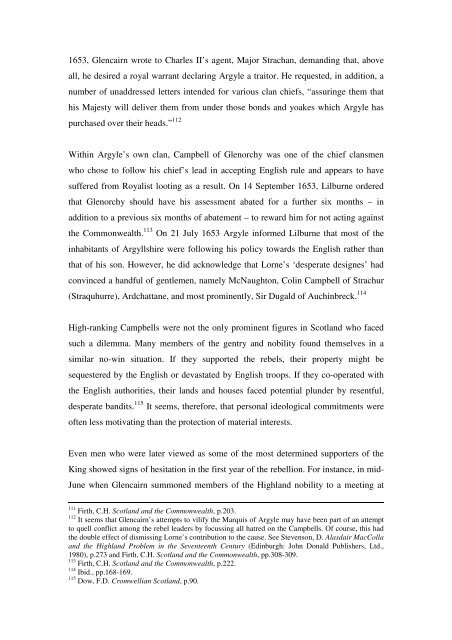The Glencairn Uprising, 1653-54 Helen Baker Department of ...
The Glencairn Uprising, 1653-54 Helen Baker Department of ...
The Glencairn Uprising, 1653-54 Helen Baker Department of ...
You also want an ePaper? Increase the reach of your titles
YUMPU automatically turns print PDFs into web optimized ePapers that Google loves.
<strong>1653</strong>, <strong>Glencairn</strong> wrote to Charles II’s agent, Major Strachan, demanding that, above<br />
all, he desired a royal warrant declaring Argyle a traitor. He requested, in addition, a<br />
number <strong>of</strong> unaddressed letters intended for various clan chiefs, “assuringe them that<br />
his Majesty will deliver them from under those bonds and yoakes which Argyle has<br />
purchased over their heads.” 112<br />
Within Argyle’s own clan, Campbell <strong>of</strong> Glenorchy was one <strong>of</strong> the chief clansmen<br />
who chose to follow his chief’s lead in accepting English rule and appears to have<br />
suffered from Royalist looting as a result. On 14 September <strong>1653</strong>, Lilburne ordered<br />
that Glenorchy should have his assessment abated for a further six months – in<br />
addition to a previous six months <strong>of</strong> abatement – to reward him for not acting against<br />
the Commonwealth. 113 On 21 July <strong>1653</strong> Argyle informed Lilburne that most <strong>of</strong> the<br />
inhabitants <strong>of</strong> Argyllshire were following his policy towards the English rather than<br />
that <strong>of</strong> his son. However, he did acknowledge that Lorne’s ‘desperate designes’ had<br />
convinced a handful <strong>of</strong> gentlemen, namely McNaughton, Colin Campbell <strong>of</strong> Strachur<br />
(Straquhurre), Ardchattane, and most prominently, Sir Dugald <strong>of</strong> Auchinbreck. 114<br />
High-ranking Campbells were not the only prominent figures in Scotland who faced<br />
such a dilemma. Many members <strong>of</strong> the gentry and nobility found themselves in a<br />
similar no-win situation. If they supported the rebels, their property might be<br />
sequestered by the English or devastated by English troops. If they co-operated with<br />
the English authorities, their lands and houses faced potential plunder by resentful,<br />
desperate bandits. 115 It seems, therefore, that personal ideological commitments were<br />
<strong>of</strong>ten less motivating than the protection <strong>of</strong> material interests.<br />
Even men who were later viewed as some <strong>of</strong> the most determined supporters <strong>of</strong> the<br />
King showed signs <strong>of</strong> hesitation in the first year <strong>of</strong> the rebellion. For instance, in mid-<br />
June when <strong>Glencairn</strong> summoned members <strong>of</strong> the Highland nobility to a meeting at<br />
111 Firth, C.H. Scotland and the Commonwealth, p.203.<br />
112 It seems that <strong>Glencairn</strong>’s attempts to vilify the Marquis <strong>of</strong> Argyle may have been part <strong>of</strong> an attempt<br />
to quell conflict among the rebel leaders by focussing all hatred on the Campbells. Of course, this had<br />
the double effect <strong>of</strong> dismissing Lorne’s contribution to the cause. See Stevenson, D. Alasdair MacColla<br />
and the Highland Problem in the Seventeenth Century (Edinburgh: John Donald Publishers, Ltd.,<br />
1980), p.273 and Firth, C.H. Scotland and the Commonwealth, pp.308-309.<br />
113 Firth, C.H. Scotland and the Commonwealth, p.222.<br />
114 Ibid., pp.168-169.<br />
115 Dow, F.D. Cromwellian Scotland, p.90.
















